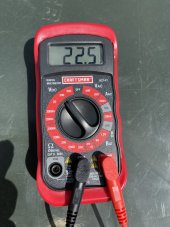robstrom
New Member
Simple question, well 2.
While installing panels, the sun will be on them, hence, power.
I have no battery yet.
As long as I don't plug them in to the charge controller, no damage correct?
2. Can I put a multimeter on the connectors to confirm continuity/ output, without a battery?
Be safe n do it out of the sun?
Thanks
While installing panels, the sun will be on them, hence, power.
I have no battery yet.
As long as I don't plug them in to the charge controller, no damage correct?
2. Can I put a multimeter on the connectors to confirm continuity/ output, without a battery?
Be safe n do it out of the sun?
Thanks



